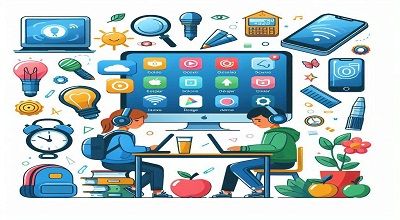Apps for the Digital & Physical Classroom
Essential apps for the digital and physical classroom can help educators enhance their teaching, engage students, and manage various aspects of the learning environment. These apps can be used in both traditional brick-and-mortar classrooms and online or hybrid teaching settings.
Here is a list of essential apps for educators:
1: Learning Management System (LMS):
Moodle, Canvas, Blackboard, or Google Classroom: These platforms help manage course materials, assignments, and communication with students.
2: Presentation and Content Creation:
Microsoft PowerPoint or Google Slides: Create and deliver presentations.
Canva: Design visually appealing materials for lessons.
3: Video Conferencing and Webinars:
Zoom, Microsoft Teams, Google Meet: Facilitate online or hybrid classes and meetings.
4: Note-Taking and Organization:
Microsoft OneNote or Evernote: Help students organize their notes and assignments.
5: Collaboration and File Sharing:
Google Drive or Microsoft OneDrive: Share documents, collaborate on projects, and store materials.
6: Interactive Whiteboard:
Jamboard, Microsoft Whiteboard, or online whiteboard apps like Explain Everything: Foster interactive learning.
7: Educational Content:
Khan Academy, Coursera, or edX: Access a vast library of educational resources and courses.
8: Assessment and Quizzing:
Quizlet, Kahoot!, or Socrative: Create quizzes and interactive assessments.
9: Classroom Management:
ClassDojo or Remind: Communicate with parents, manage behavior, and share updates.
10: Learning Games:
Kahoot!, Quizlet, or educational game apps to make learning fun.
More here…
11: Language Learning:
Duolingo, Rosetta Stone, or Memrise: Help students learn new languages.
12: Reading and E-books:
Kindle, iBooks, or online library platforms like Epic! for younger students.
13: Educational Videos:
YouTube (with restricted mode enabled), Khan Academy, or National Geographic Kids.
14: Augmented Reality (AR) and Virtual Reality (VR):
Apps that bring immersive experiences to the classroom, such as Google Expeditions or AR flashcard apps.
15: Classroom Communication:
Remind or ClassTag: Keep parents informed about classroom activities and announcements.
16: Accessibility and Special Needs:
Apps like Voice Dream Reader or Proloquo2Go for students with special needs.
17: Digital Storytelling:
Adobe Spark or StoryMapJS: Encourage students to create digital stories and presentations.
18: Math and Science:
Desmos, GeoGebra, or Wolfram Alpha: Assist students with complex mathematical and scientific concepts.
19: Coding and Computer Science:
Scratch, Tynker, or Code.org: Teach programming and computational thinking.
20: Polling and Feedback:
Mentimeter or Poll Everywhere: Engage students and gather real-time feedback.
Summary
It’s important to choose apps that align with your teaching goals and the needs of your students. The specific apps you select may also depend on the age group you are teaching and the subjects you are covering. Additionally, consider issues of student privacy and data security when using educational apps in your classroom.
